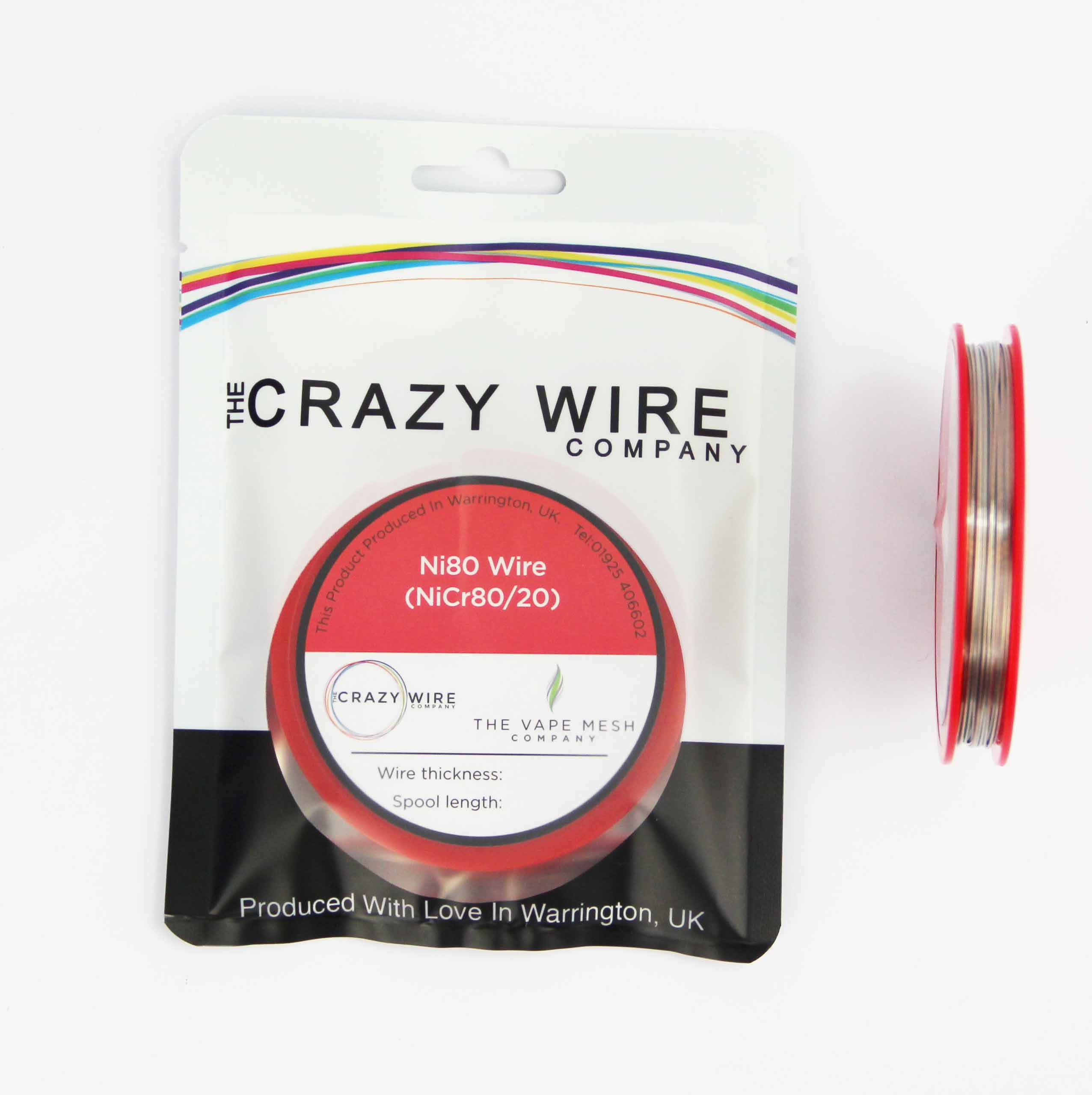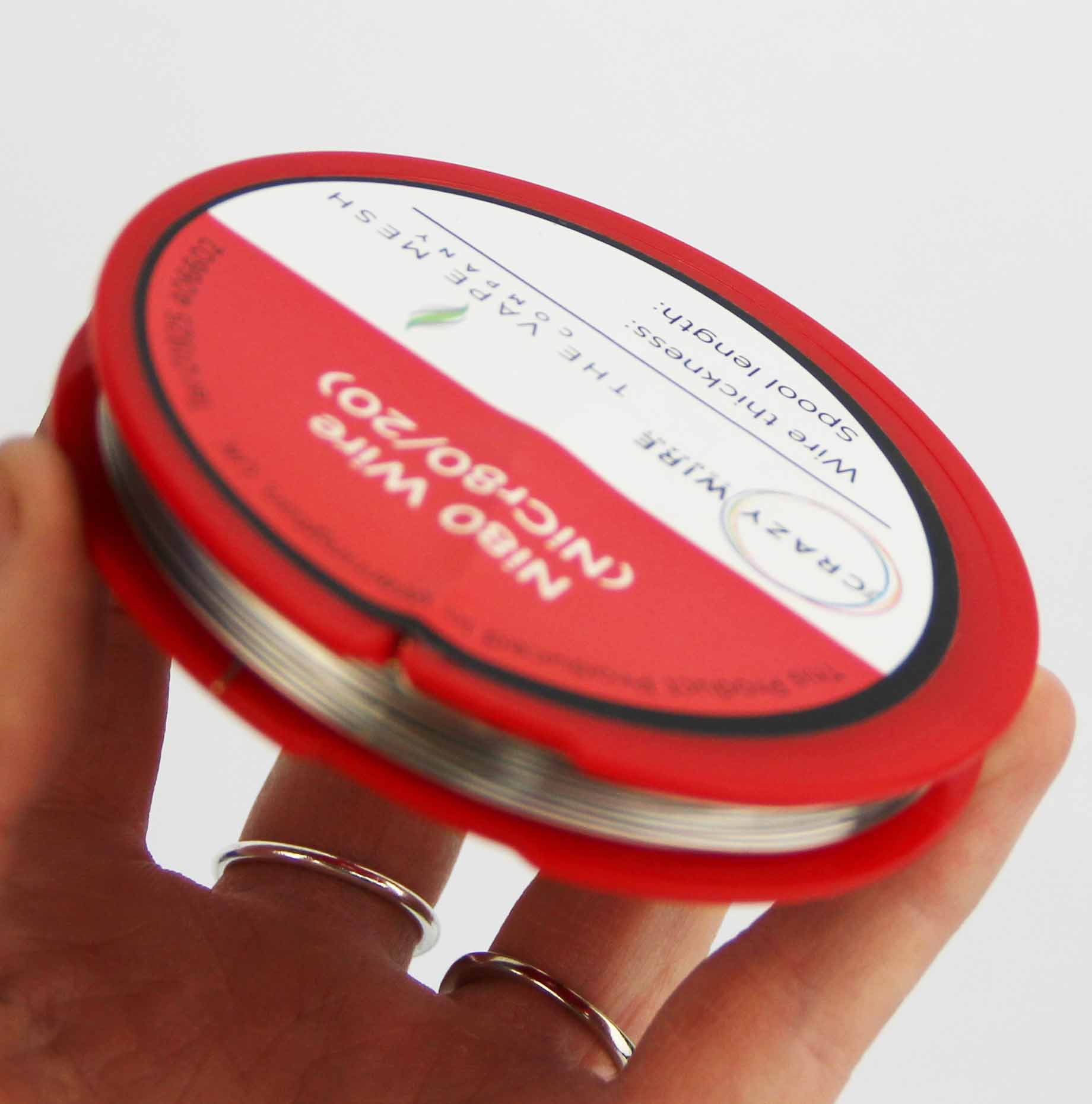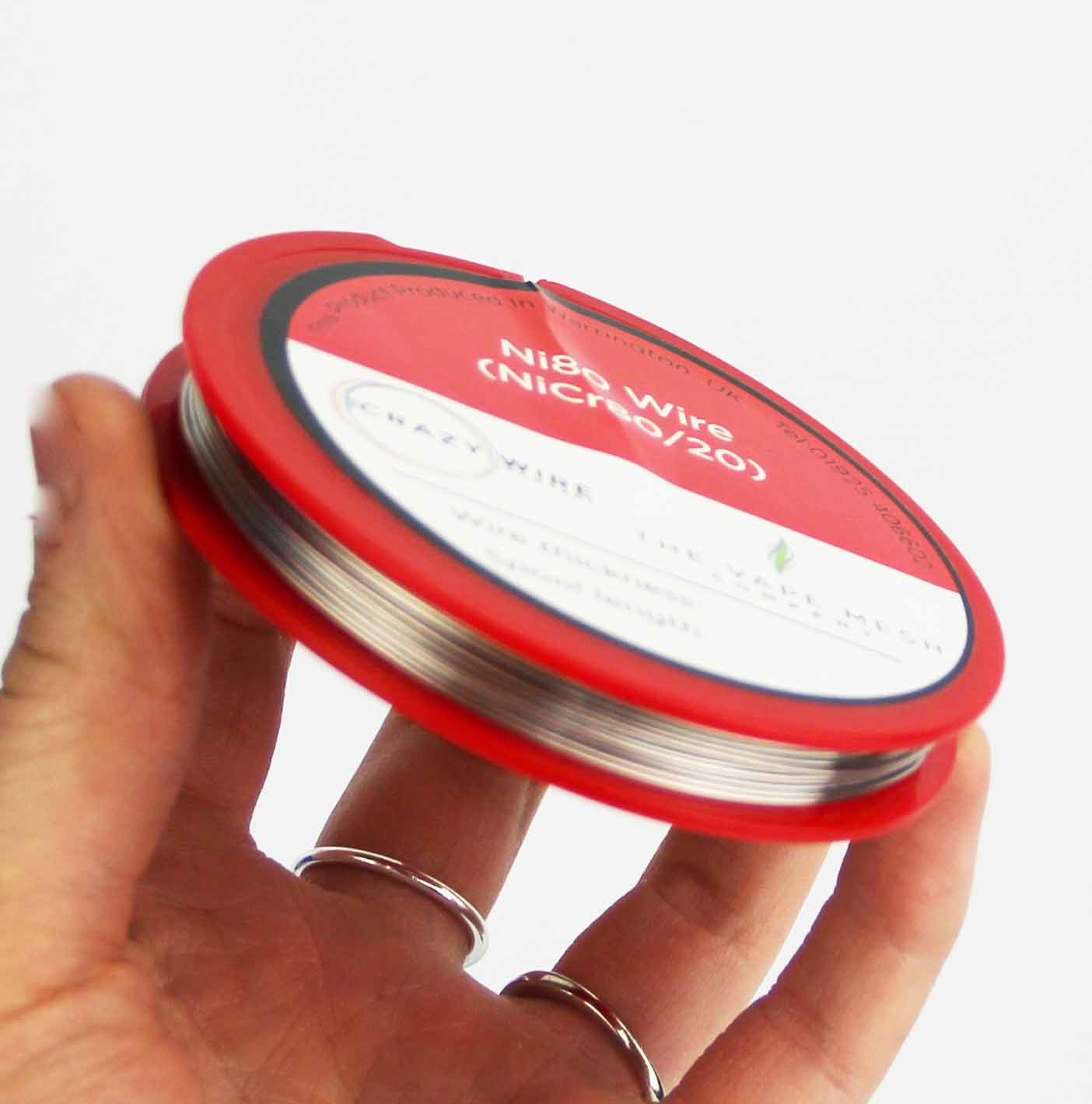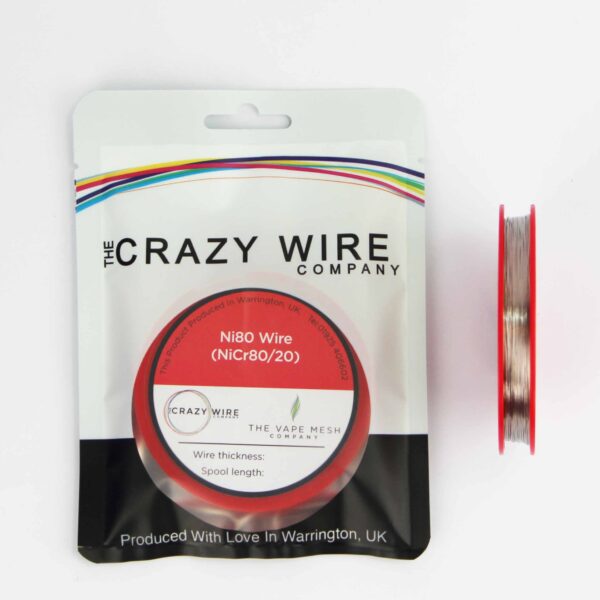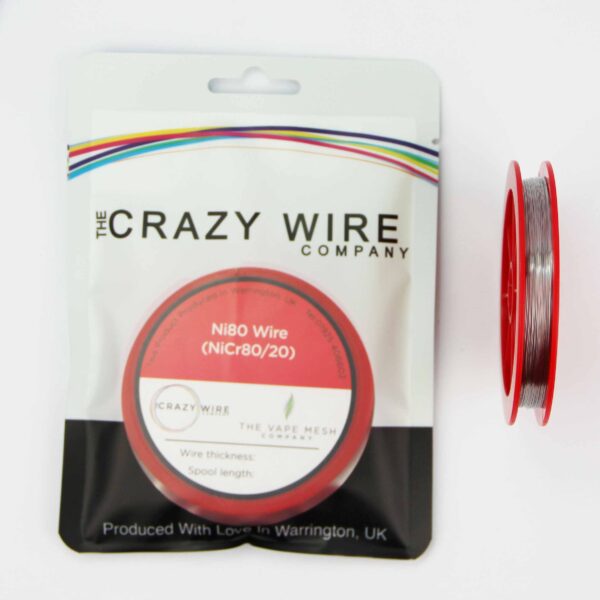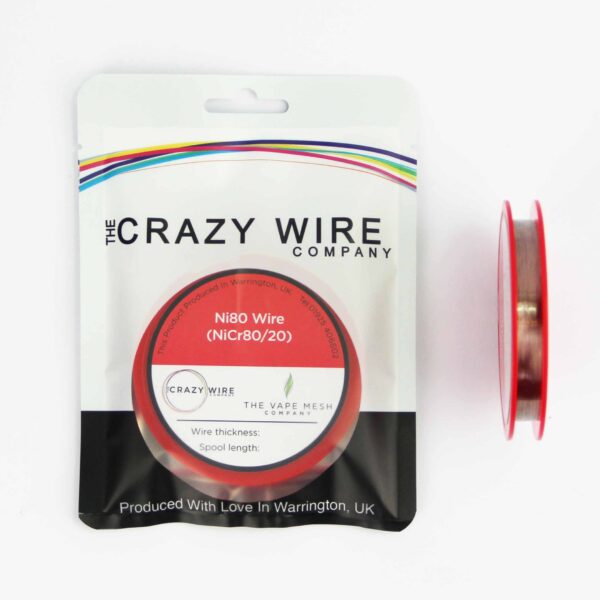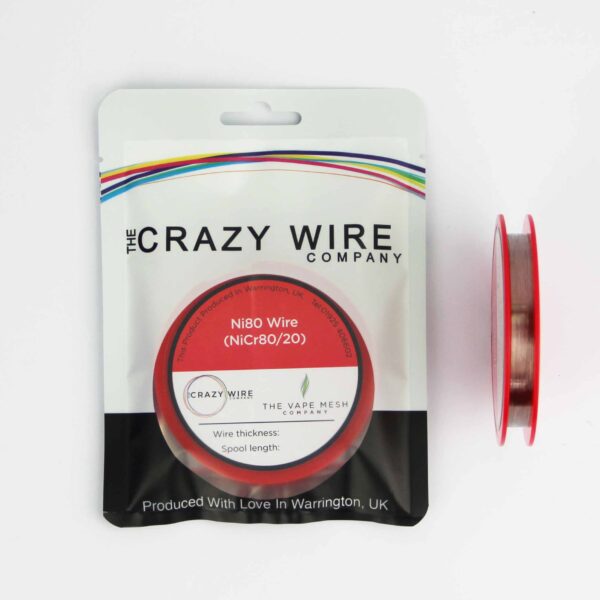Description
0.64mm Ni80 Ni CR Alloy Heating Wire
The Crazy Wire Company are well known as suppliers of top quality ni cr alloy resistance wire. We have enormous stock levels at all times, as we use this wire to weave our high specification woven mesh products. Our brilliant staff are experts in producing our spools of round wire on our 6 rapid action winding machines. All spools are produced to carry a little extra length to make up for any waste when handling the product.
The 0.64mm (22 AWG) Ni80 Ni Cr resistance wire, composed of 80% nickel and 20% chromium, is renowned for its heat resistance and durability. This ni cr alloy is resistant to oxidation and corrosion, making it ideal for heating elements in household appliances like toasters and hairdryers. Its consistent resistance also serves well in electronic components such as resistors. Malleable and durable, this ni cr wire meets various application needs, combining longevity with versatility.
The 0.64mm diameter of the wire indicates the thickness of the wire, which can affect its resistance and heating performance. Thicker wires tend to have lower resistance and generate more heat, while thinner wires tend to have higher resistance and generate less heat. The choice of wire diameter will depend on the specific requirements of the application and the desired heating performance.
Key product details:
- Diameter – 0.64mm (640 Micron – 22 AWG)
- Ohms/m – 3.41
- Technical Specification:
- Ni – Rest
- Cr – 20.0 – 23.0
- Fe – <1.0
- Max Continuous Service Temp Of Element – 1200
- Micrographic Structure – Austenite
- Magnetic Properties – Nonmagnetic
- Electrical resistance is high
- Corrosion resistance is high
Why Use The Crazy Wire Company
- Quality of products: The Crazy Wire Company always offer high-quality products that meet industry standards and customer expectations.
- Selection: We offer a wide variety of wire products and sizes to meet the diverse needs of our customers. We have more than 600 products available through our site and counting.
- Price: We always offer the best value possible. Our wires are available as part of our major weaving processes, so it is bought at the best possible rate.
- Availability: Our products are kept in house and are ready to ship immediately.
- Customer service: Our experienced staff help our customers feel confident in their purchases and provide assistance when required.
What Else Is Available?
We do not only offer Ni80 round wire. We also have a huge range of KA1 and stainless steel round wire in immediate stock too.
Ribbon wire and flat wire are stocked for immediate dispatch too.
FAQs About This Wire
Can We Use A Nichrome Wire As A Fuse?
No, using a nichrome wire as a fuse is not recommended because it doesn’t have the necessary characteristics to function as an effective fuse.
A fuse is designed to protect electrical circuits by interrupting the flow of current when it exceeds a safe limit. The fuse wire must be designed to have a lower melting point than the wire it is protecting so that it will melt and break the circuit if a dangerous current flows through it. Nichrome wire, which is made of nickel and chrome, has a high melting point and is not designed to break the circuit in case of an over-current situation.
In fact, using nichrome wire as a fuse could actually be dangerous because it may not provide the necessary protection to the circuit, potentially leading to damage to the equipment or a fire hazard. It’s important to use the correct type of fuse for the application to ensure safety.
Why Is Nichrome Wire Used In Electric Heaters?
Nichrome wire is commonly used in electric heaters because it has several properties that make it well suited for heating applications.
Firstly, nichrome is a resistive material, which means that when an electric current passes through it, the wire resists the flow of electrons and generates heat as a result. This makes nichrome an efficient heating element for electric heaters.
Secondly, nichrome wire has a high resistance to oxidation, which means it can withstand high temperatures without corroding. This allows nichrome to be used in high-temperature heating applications without degradation over time.
Thirdly, nichrome wire has a high melting point, which means that it won’t melt or deform even when it is subjected to high temperatures. This makes it a safe and reliable heating element for electric heaters.
Overall, the combination of high resistance, resistance to oxidation, and high melting point make nichrome an ideal material for use in electric heaters.
Is Nichrome A Resistor?
Yes, nichrome is a resistor. A resistor is an electrical component that resists the flow of electrical current and is used to regulate the flow of current in a circuit. When an electric current passes through a resistor, it encounters resistance, which results in the conversion of some of the electrical energy into heat energy.
Nichrome is an alloy of nickel and chromium, and it has a relatively high electrical resistance. This high resistance makes nichrome a good material for use as a resistor in heating applications, as well as in other applications where a controlled amount of electrical resistance is needed.
In electric heaters, nichrome wire is wound into a coil and used as a heating element. When an electric current passes through the nichrome wire, it generates heat due to its resistance to the flow of electrons. The amount of heat generated by the nichrome wire can be controlled by adjusting the current passing through the wire, which makes nichrome a versatile material for use in a wide range of heating application
How To Calculate The Volt For A Nichrome Wire Length?
The voltage (V) required to heat a nichrome wire of a given length can be calculated using Ohm’s law, which states that the voltage (V) across a resistor is proportional to the current (I) flowing through it, and the resistance (R) of the resistor:
V = I * R
where:
- V = voltage (volts)
- I = current (amps)
- R = resistance (ohms)
To calculate the voltage required to heat a nichrome wire, you need to know the resistance of the wire and the current you want to pass through it. Once you have that information, you can use the following formula:
V = I * R
For example, if you have a nichrome wire with a resistance of 10 ohms and you want to pass a current of 2 amps through it, the voltage required would be:
V = 2 * 10 = 20 volts
Note that the resistance of nichrome wire can change with temperature, so it’s important to consider the temperature-dependence of the resistance when calculating the voltage required to heat the wire. Additionally, the required voltage may be affected by other factors such as the length, thickness, and material composition of the nichrome wire, so it’s always best to consult a knowledgeable expert or manufacturer’s specifications for more accurate results.
Check out our blog ‘what is nichrome‘ for more information on ni80 wire in general. Our goal for our blogs and help guides is to answer as many questions as possible to help to explain the possibilities of mesh to our customers.
We also offer similar products through our highly popular eBay store, check us out there too.
Contact our team today if you have any questions at all. We are always really keen to help in any way that we can.

